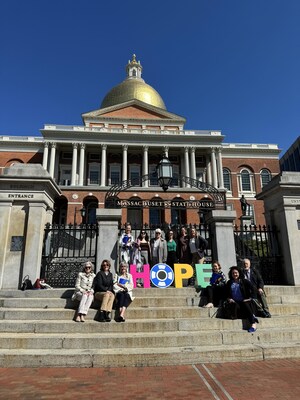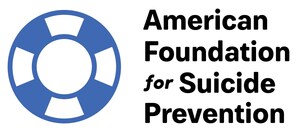The treatable depressive disorder can last from early Fall until Spring, triggered by darker, colder days
CHICAGO, Feb. 8, 2023 /PRNewswire/ -- Seasonal Affective Disorder (SAD), which often begins with the first colder days of the Fall and lasts until warmer Spring days, is on the rise along with other depressive disorders. The Illinois chapter of the American Foundation for Suicide Prevention (AFSP) recommends knowing the signs of the illness and getting help when warranted.
According to Mental Health America, approximately five percent of adults in the U.S. show symptoms of SAD, a type of depression that typically lasts about 40 percent of the year. Seasonal depression occurs more frequently among women – four of five people with seasonal depression are female. Generally SAD is seen as an adult affliction, with the main age of onset between 18 and 30 years old, but symptoms can appear at younger ages.
Many people will note feeling down when the cold weather sets in and there are fewer hours of sunlight, but when someone feels depressed for most of the day, nearly every day, and loses interests in things they enjoy, has low energy and problems with sleep, changes in appetite including eating more and craving carbohydrates, trouble concentrating, and social isolation, Seasonal Affective Disorder may be the cause. While less common, some people may also find summer-pattern SAD impacts them when warmer months hit, leading to insomina, poor appetite, restlessness and anxiety.
"The good news is that Seasonal Affective Disorder – SAD – is treatable," said Beth Morrison, a licensed clinical professional counselor and board president of AFSP-Illinois. "Getting outdoors for natural sunshine, regular exercise, light box therapy, antidepressants, vitamin D and psychotherapy have all been shown to be successful in combatting SAD."
Morrison noted that light box therapy is one treatment for SAD. Using a light box for 20 minutes at least three times a week can help to alleviate symptoms. Vitamin D supplements can have benefits as can getting outside for a brisk walk to provide natural vitamin D as well as exercise.
"It's important to recognize the signs of seasonal depression and get help whether it's for yourself or your loved ones," notes Morrison. "Check in with friends and spend time asking questions. Prompt them to see their primary care physician, therapist or check for online resources if they need help."
AFSP and its Illinois chapter are dedicated to improved research, education and advocacy. Through its statewide network of volunteers, AFSP Illinois offers prevention education programs that emphasize the importance of research-proven self-care techniques as well as the value of engaging professional support.
If you or someone you know is at risk of suicide, please call or text 988 for the Suicide Crisis Lifeline. Or text TALK to 741741 or go to https://suicidepreventionlifeline.org/.
About the American Foundation for Suicide Prevention:
American Foundation for Suicide Prevention is dedicated to saving lives and bringing hope to individuals affected by suicide. The organization creates a culture that is smart regarding mental health through educational programs, advocation for suicide prevention, and providing support for those affected by suicide. All donations go towards these efforts with the goal to greatly reduce the national suicide rate. For more: https://afsp.org/chapter/illinois
Suicide Prevention Resources: https://afsp.org/suicide-prevention-resources
Suicide Warning Signs: afsp.org/signs
Media: Reporting on Suicide Prevention: https://afsp.org/reporting-on-suicide-prevention
SOURCE American Foundation for Suicide Prevention

WANT YOUR COMPANY'S NEWS FEATURED ON PRNEWSWIRE.COM?
Newsrooms &
Influencers
Digital Media
Outlets
Journalists
Opted In





Share this article